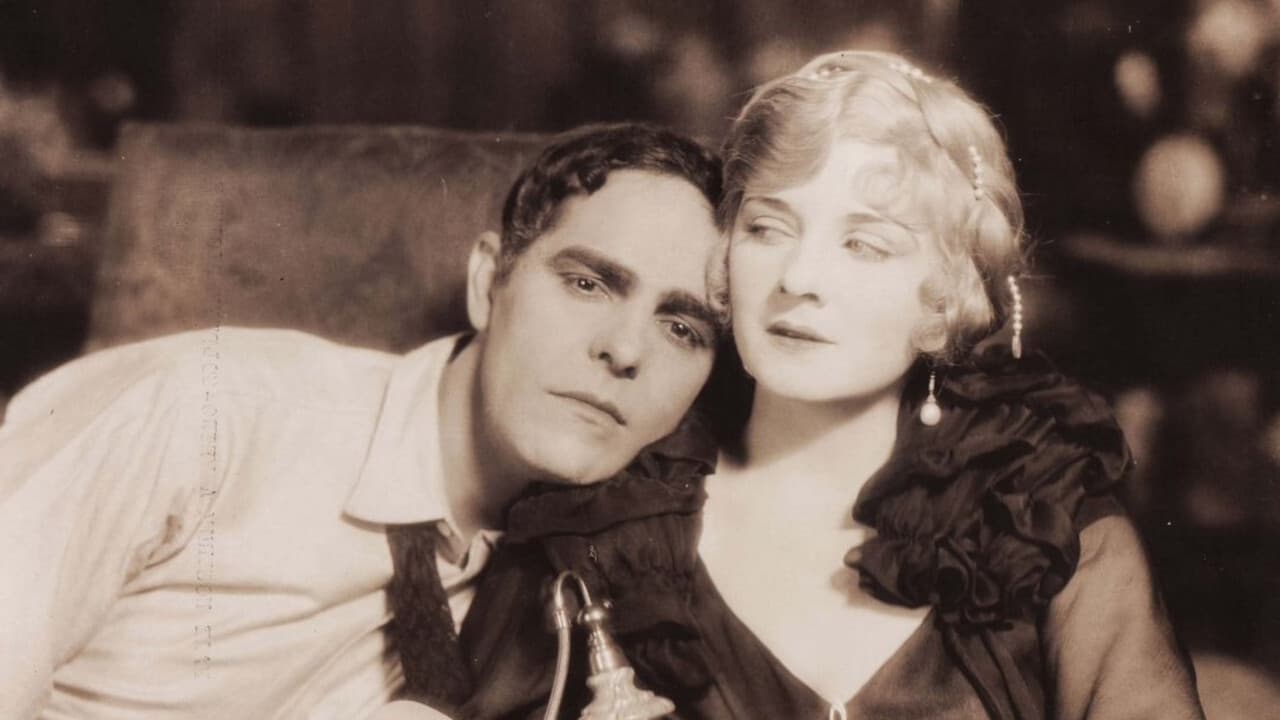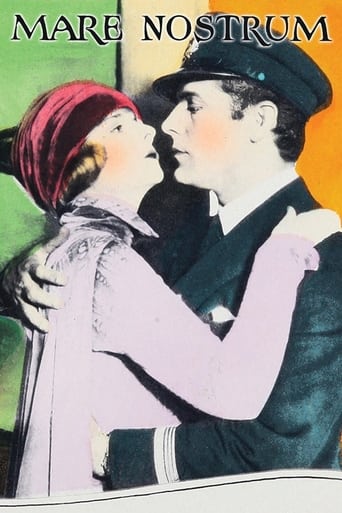Ezmae Chang
This is a small, humorous movie in some ways, but it has a huge heart. What a nice experience.
Zandra
The movie turns out to be a little better than the average. Starting from a romantic formula often seen in the cinema, it ends in the most predictable (and somewhat bland) way.
Jerrie
It's a good bad... and worth a popcorn matinée. While it's easy to lament what could have been...
romanorum1
The movie focuses on the life of a man who sails the Mediterranean Sea. As a child Ulysses Ferragut (Antonio Moreno), a Spaniard, had a passion for the sea. His uncle, the Triton (Uni Apollon), instilled in him sea tales and stories of the pagan goddess Amphitrite, a protector of sailors. He kept a supposed picture of her on the wall. Against the wishes of his father Don Esteban, who wants him to become a lawyer, Ulysses grows up to become a sea captain of his own fast freighter, the "Mare Nostrum." As he spends so much time at sea (and without much profit) he is rarely with his wife Cinta and young son Esteban. After World War I begins (1914), Ulysses' merchant business becomes very rewarding. After his ship moors at Naples in still-neutral Italy, Ulysses takes a vacation, visiting the old Roman ruins at Pompeii, destroyed long before by the eruption of Mt. Vesuvius (79 AD). It still smolders. At the site Ulysses meets enthralling Freya Talberg (Alice Terry), who soon tells him point blank that she is a spy for her native Austria (Austro-Hungarian Empire), the main ally of Germany. Her traveling companion is mannish, heavy-set Dr. Fedelmann (Mademoiselle Paquerette). Declaring that he is a neutral Spaniard and not directly involved with the war, Ulysses is smitten with Freya. He notes that her likeness is the same as that of Amphitrite. Ignoring his small family, Ulysses begins a long affair with Freya.Meanwhile, the concern of the German spies – Fedelmann and Count Kaledine – who have set up headquarters in Naples, is that the Italians are contemplating joining the allies in the war (English, French, and Russians) against the Central Powers (Germans, Austrians, and Hungarians). After Italy does indeed declare war against Austria (1915), Fedelmann and Kaledine leave Italy to set up shop in neutral Spain (Barcelona).Encouraged by Freya to help Germany, Ulysses provides fuel for a German submarine operating in the Mediterranean. He is promised that the subs will torpedo only military vessels, not passenger ships. Under an odd-looking German commander, the sub later torpedoes an English passenger vessel that is carrying his son, Esteban, killing him. Mournful Ferragut decides to pursue those responsible for his only son's death. Subsequent scenes of note are the long crowd chase of a German spy in Marseilles, the firing squad scenario, and the final underwater setting.Filmed on location in several countries, Rex Ingram's movie was probably his most ambitious enterprise outside of "The Four Horsemen of the Apocalypse." The predictable, melodramatic spy-story really is not too thrilling, but good visuals/photography and on-location filming in France, Italy, and Spain help. See those large ships in Naples harbor; never mind the sea-models. Uni Apollon certainly reminds one of an old sea-dog. Alice Terry is alluring while Antonio Moreno is handsome. Grotesquely untidy and obese Hughie Mack is the jolly Spanish servant, Caragol. One wants to cry out to him: "Caragol, take a bath, and please, burn those clothes!" In the end he does find himself immersed.The source of the phrase, "Mare Nostrum" originates solely from the Roman Empire. This huge dominion, the most far-flung and durable of antiquity, encompassed the entire Mediterranean Sea. As the Romans controlled the Mediterranean basin for hundreds of years, they fittingly called the vast water-system "Our Sea" (Mare Nostrum). Not only was the sea a link for many nations of the empire, but it also helped Rome to ship troops to faraway trouble spots.
MARIO GAUCI
This is a lavishly produced wartime romance and, as is typical of Ingram, quite stylishly handled (benefiting also from the fact that it was filmed in Europe, the director himself being based in France). The plot places its old-fashioned impossible and, inevitably, tragic love story against the backdrop of a nostalgic view of the sea and the simple fisher-folk who live and die in it, the bourgeoisie with their stuck-up attitude and high ideals and, naturally, an impending world-war situation; for all that, it's most interesting when dealing with the various espionage elements and especially the two submarine attacks (which must have been a novelty at the time) led by a bald-headed and aristocratic German officer, obviously inspired by Erich von Stroheim!Still, Alice Terry's poignant performance as the female spy (who has mixed emotions about her mission and who happens to be the spitting image of Amphitrite, the Sea Goddess who protects fishermen) is the core of the film; this was perhaps the best role she ever had (directed, naturally, by her husband). Antonio Moreno is less impressive as the male lead, though his disheveled appearance when forced to work for the enemy and following his son's death (for which he is partly to blame) is appropriately world-weary. The beautiful and poetic finale, then, sees the drowning Moreno (after his ship was torpedoed by the sub he helped fuel!) being picked up by Amphitrite herself. Reportedly, this was Ingram's favorite among his own films - as well as Terry herself and Moreno, too!
preppy-3
Ulysses (handsome Antonio Moreno) owns a boat called the Mare Nostrum. He also has an uncaring wife but a son Estaban (Mickey Brantford) whom he loves. An evil, sexy German spy Freye (Alice Terry) seduces Ulysses and convinces him to help bring supplies to a German sub. He does and the sub ends up destroying a ship that Estaban is on. Ulysses vows to kill all the people responsible.This silent film was believed lost for many years. Thankfully it's been found and beautifully restored. Basically, this is a tragedy so it's hardly a happy film but still it's extremely well-made and directed by Rex Ingram, one of the best silent film directors. There are some very amusing miniature ships and subs in some sequences, but this WAS 1926--that's probably the best they had! The acting is good too. Moreno was a very popular star in his day--sadly, he's forgotten today. He's good-looking and gives one hell of a performance--some of his reaction shots were incredibly good. Terry was obviously hired because she was married to director Ingram, but she was a good actress and she's good here. She was cast against type playing an evil woman (she usually played the good girl) and she pulls it off. Her scene in front of the firing squad is just great. And young Brantford is very good as Estaban. The only bad thing was Caragol (Hughie Mack)--an obese man who provides unfunny comic relief. And it DOES have a silly ending.Still, a great silent film. Well worth catching.
Ron Oliver
A young Spanish sea captain learns about life & death, great love & passionate hatred, while sailing the waters of MARE NOSTRUM - ‘Our Sea.'Brilliant & disturbing, this was the last important film from acclaimed silent director Rex Ingram. Produced to great effect on location in the Western Mediterranean, this was one of Metro's biggest films of the 1920's. Returning to the author who had already given him enormous success with THE FOUR HORSEMEN OF THE APOCALYPSE - Vicente Blasco Ibáñez - Ingram would once again produce a film of exceptional high quality. Today, it is all but forgotten...Antonio Moreno gives a vivid performance as the Captain who is used so harshly by fate. His doleful eyes linger in the imagination of the viewer long after the end of the film. Alice Terry - Mrs. Rex Ingram - is sultry & beautiful as the Austrian spy who seduces Moreno. Her firing squad scene is considered a classic of pacing & composition, and she is magnificent in it.Uni Apollon is very effective in his few minutes as an old Spanish sea dog. Madame Pâquerette, as a large, mannish German spy master is formidable. Hughie Mack, as an absolutely loyal, grossly obese Spanish servant, is especially satisfying. (This excellent character actor would die from heart disease the year after MARE NOSTRUM's release, at the age of only 42.)The unfortunate use of obvious models for some of the scenes at sea is more than mitigated by the presence of real ships & submarines in others. The filming among the ruins in Italy's Pompeii & Paestum, as well as the spy chase along the waterfront in Marseille, add tremendously to the overall ambiance of this remarkable film.The underwater sequences with Amphitrite, goddess of Mare Nostrum, are absolutely haunting.

